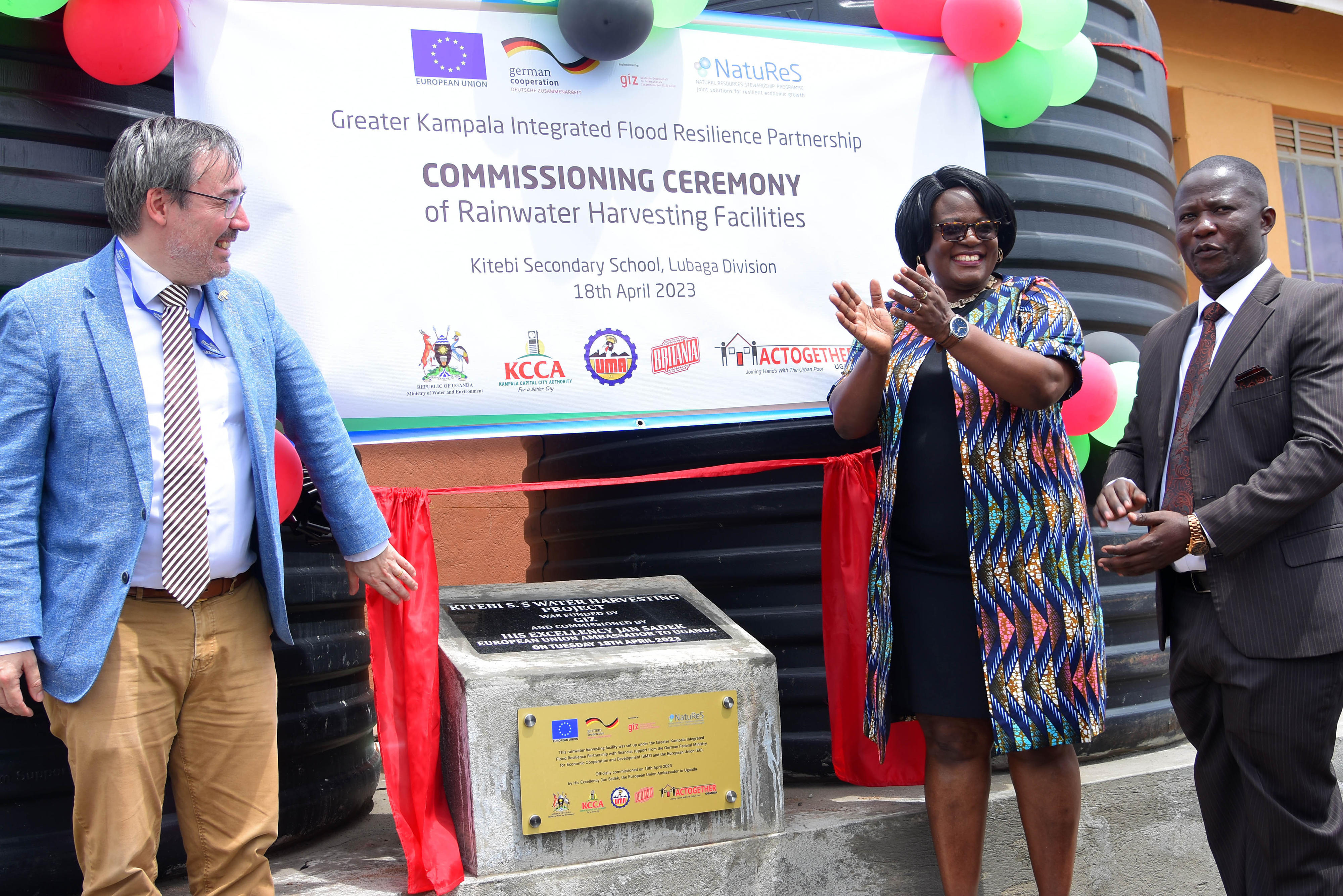Access to safe drinking water remains a dream for most schools

Mr Muhammed Kamulegeya, the Kitebi SSS headteacher (R) alongside KCCA Executive Director Dorothy Kisaka and EU Team leader for Sustainable Economy, Mr Deridder Lennart launch the rainwater harvesting facilities at Kitebi Secondary School in Rubaga, Kampala. PHOTO | FRANK BAGUMA
What you need to know:
- The Director of Public Health Services and Environment at Kampala Capital City Authority (KCCA), Dr Daniel Okello says the poor state of sanitation in Kampala especially in slum areas is reported to contribute to about 90 percent contamination of the protected underground water sources like spring water.
Although access to water and sanitation are human rights that are fundamental to every human being including school children, several schools are still struggling to make this a reality.
During the commissioning of an 80,000 litre water tank donated to Kitebi Senior Secondary School in Rubaga Division Kampala, by the European Union through the German Development Cooperation (GIZ), the Director for Basic and Secondary Education in the Ministry of Education and Sports, Mr Ismail Mulindwa confessed that a bigger percentage of institutions of learning still lack access to adequate clean drinking water.
The donation was done under the Greater Kampala Integrated Flood Resilience partnership.
“We have been struggling to provide safe water to learning institutions. Access in most schools is still a challenge. We welcome the initiative by Kampala Capital City Authority and its partners for providing water harvesting facilities to some of our schools, markets and other public places to ease access to safe water, free of diseases,” he says.
However, experts say embracing rainwater harvesting could bridge the existing gap in schools, especially in areas where most underground sources of water ware contaminated.
The Director of Public Health Services and Environment at Kampala Capital City Authority (KCCA), Dr Daniel Okello says the poor state of sanitation in Kampala especially in slum areas is reported to contribute to about 90 percent contamination of the protected underground water sources like spring water.
Kampala is estimated to have more than 4.5 million people traversing through the city daily, yet it has about 1,000 public toilets, which predisposes the burgeoning population to health risks. Open defecation, which leaves many parts of the city littered over lack of latrines among some city residents is common.
At the national level, 14 million Ugandans still practice open defecation according to the Ministry of Health.
Similarly, 36 percent of communities in the country have basic sanitation facilities, 24 percent of which are in rural areas and 47.9 percent are in urban areas, while hand washing in rural areas is at 35.8 percent and 53.8 percent for urban.
Solutions to narrative
According to United Nations Children’s Emergency Fund (UNICEF) poor sanitation and hygiene, as well as unequal access to safe drinking water, make thousands of children very sick and at risk of death caused by diarrheal related diseases.
“We are aware that there are solutions to narrative. We can tap rainwater as a safe option,” Dr Okello advises.
The World Health Organization (WHO) states that diarrhea is a symptom of infections caused by a host of bacterial, viral and parasitic organisms, most of which are spread by faeces-contaminated water.
The executive director of KCCA, Ms Dorothy Kisaka says rainwater harvesting should be a norm for schools and public places that lack adequate safe water, including markets and shopping malls.
Ms Kisaka says provision of social services such as education, water and sanitation, health are critical given the current rapid urban population growth rate. It is estimated that 60 percent of the population will live in cities by the year, 2030.
“Without a vision, people perish. We need to prepare ourselves, get ready and create room for people who will be joining us. They will need education, clean water and good roads. We must continuously improve our facilities,” she says.
The head teacher of Kitebi Senior Secondary School, Hajji Muhammed Kamulegeya says the water tank that was donated to the school would help management save over Shs1m that the school has been spending in buying water.
Kamulegeya also urges government to increase the number of teachers who are on government payroll to promote effective teaching and learning at his school.
Founded in 1983 as a government aided school, Kitebi SSS whose current population stands at 3,700 is manned by a total of 200 teachers, yet only 50 of them are on pay roll.
He also says that the school is in the dare need of a staffroom and more classrooms to address congestion.
Deridder Lennart, the Team leader Sustainable Economy for the European Union Delegation partnerships are key in addressing diverse challenges including the effects of climate change.


